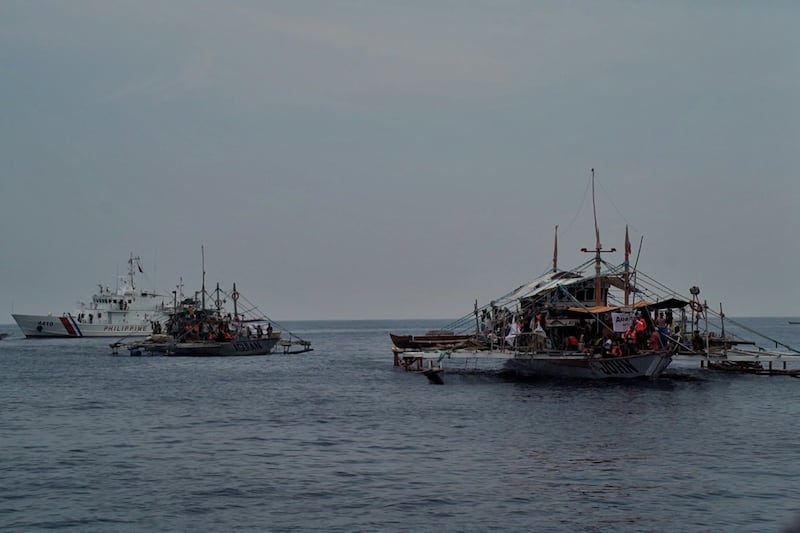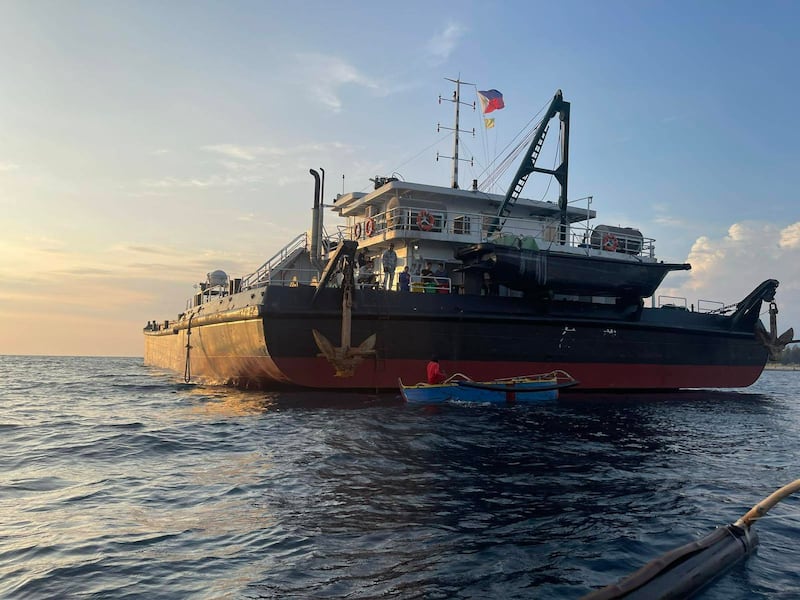The Philippines hit back Friday against what it called China’s “illegal” new order authorizing its coast guard to detain foreign boats and people suspected of trespassing into Beijing-claimed waters in the disputed South China Sea.
The Chinese coast guard on Wednesday issued Order No. 3, which will take effect on June 15 and authorizes its personnel to hold foreign nationals for up to 30 days – and as many as 60, in some cases.
The order's release took place amid rising bilateral tensions over the waterway and as a Philippine civilian resupply convoy sailed toward Scarborough Shoal, which lies within Manila's exclusive economic zone, but is also claimed by China.
"This is another illegal action of China," Philippine Coast Guard (PCG) spokesperson Jay Tarriela said during a press briefing Friday, as he rejected that Beijing's new policy applied to waters within Manila's EEZ.
“The mere fact that they claim full sovereignty over our own exclusive economic zone and they are trying to justify their imaginary nine-dash line,” he said, referring to the boundary on Chinese maps that demarcates Beijing’s South China Sea claims.
According to a Mandarin-language document shared by the Chinese Embassy in Manila to reporters, the order covers “administrative cases that occur in the waters under the jurisdiction” of China. While the document makes no direct mention of the South China Sea, Beijing claims the waterway almost in its entirety.
Under the order, foreign vessels may be seized and a foreign person “may be detained with the approval of the person in charge of the coast guard agency” if they are suspected of illegal entry and exit, assisting others “to illegally enter and exit the country,” and of “endangering national security and interests,” among other activities.
Foreigners may be exempted from detention if they are pregnant or nursing an infant, below 16 years old, and older than 70 years old, among others, according to excerpts from the order that were translated into English.
“Administrative cases that occur in waters under the country’s jurisdiction shall be under the administration of the Coast Guard agency in accordance with the law, and shall be under the jurisdiction of the Coast Guard agency corresponding to the place where the violation was committed,” the order stated.
The new order also prohibits unauthorized conduct of surveying and mapping activities in waters under Beijing’s jurisdiction, and warns that such circumstances are considered grave or serious.
‘Illegal’ action
At the press briefing, Tarriela warned China against repercussions of implementing its new order.
“China will also have to understand the fact that once they implement this law that they are saying now, it’s not just the Philippines that will be affected by this. They have to implement it on waters where Vietnamese, Malaysians, Indonesians, and other Southeast Asians are pressing on the nine-dash line claim of China,” he said.
“It’s a very big problem for them.”
Aside from the Philippines and China, Vietnam, Brunei, and Malaysia also have overlapping claims to the South China Sea. Taiwan is also a claimant.
On Friday, a lawmaker and a security analyst urged the Philippine government to file a case against China before an international court over the new policy.
“If any country has a right to arrest foreigners, it is the Philippines. China is the one trespassing in our territorial waters and our exclusive economic zone, and now it has the gall to say that they would arrest non-Chinese in our waters,” House Deputy Minority Leader France Castro said in a statement.
“The Philippines should expedite filing a case against China again in the Permanent Court of Arbitration and the United Nations. The international community, especially the [Association of Southeast Asian Nations] should also speak up against China’s blatant disregard of Philippine sovereignty, the 2016 arbitral ruling, and the [United Nations Convention on the Law of the Sea],” she also said.
In 2016, the Philippines won a landmark international arbitration case against China that stemmed from a bilateral standoff over Scarborough Shoal, which Beijing has virtually controlled since 2012.
On Friday, the civilian convoy returned to Luzon island after an advance boat had delivered food and fuel to Filipino fishermen who were fishing near the disputed shoal, organizers said.

"We see the defiance of the Filipino fisherfolk. The main reason why they went to Scarborough Shoal is to fight for their fishing rights, the [sovereign] rights of our country," Security analyst Chester Cabalza told the ABS-CBN news program "Dateline Philippines" on Friday.
“The mere fact that China has pronounced the new law which they will implement by June means that they’re afraid. There’s fear in China right now because they’ve seen civilians coming to [Scarborough Shoal],” he said.
Geopolitical analyst Don McLain Gill called the new Chinese policy illicit and baseless.
“China is quite notorious for using lawfare as a means to [establish] its de facto exclusionary policies in the greater South China Sea and the West Philippine Sea in particular,” Gill told BenarNews on Friday.
The West Philippine Sea is how Filipinos refer to South China Sea waters that lie within the Philippine EEZ.
“From its foreign fishing ban to the recent announcement, Beijing tries to illicitly enforce so-called laws in other countries’ EEZ as a show of force. However, this doesn’t change the fact that such enforcements are illegal and clearly against UNCLOS,” Gill said.
The Philippine Department of Foreign Affairs and the National Security Council did not immediately respond to BenarNews requests for comment.
BenarNews also tried to contact the Chinese Embassy to seek clarification and comment, but was unsuccessful.

Meanwhile on Thursday, as the Filipino civilian convoy was heading back to Luzon, the Philippine Coast Coast Guard said it had detained a Sierra Leone-flagged ship, the MT Hyperline 988, on suspicion of having turned off its its automatic identification system (AIS), and its seven-member crew.
All seven crew members were Chinese nationals, the PCG said.
BenarNews is an RFA-affiliated news service.
